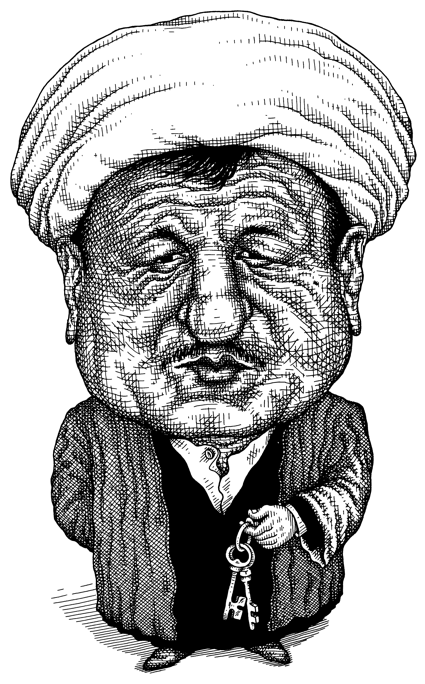

|
Where the World's Views of America Come into Focus
|



By Alexandre Adler
May 18, 2005
Original Article (French)
![]()
The American policy of energetic and intrusive support in favor of democracy in the Muslim world has just undergone a full speed crash into much more complex realities. A revision will inevitably be necessary, and soon. Let us hope that this revision is made quickly, skillfully and without giving rise to new victims, because errors in evaluation sadly have their consequences.
Four countries with very different histories and social conditions already challenge America’s entire strategy. They are, in order of increasing importance: Uzbekistan, Syria, Egypt and Iran. Each, in its own way, defies the Bush Administration’s new democratic-humanitarian plan.
Let’s start with the simplest one, Uzbekistan. Many observers would agree that Islam Karimov, the despotic president of this country of 25 million inhabitants, has engaged in corruption and authoritarianism at levels much higher than those of his post-Soviet colleagues: Kuchma in Ukraine, Shevardnadze in Georgia and Akayev in bordering Kyrgyzstan. But comparison does not make reason: there is no “orange revolution” in sight in Tashkent [the Uzbek capital] -- not even the replacement of one neo-communist team with another, as was the case two months ago in Kyrgyzstan.
— BBC VIDEO NEWS: U.S. and Britain Call for Investigation Into Uzbek Massacre, May 19, 00:01:37In the heart of Central Asia, marked like Russia by a duality of capitals – Samarkand, a city with great religious significance, and Tashkent, a city established by the Soviets at the extreme border of the country, largely to govern in Moscow’s shadow – Uzbekistan is, unfortunately, seeing a rise in a militant Sunni Islam that draws support from Pakistan, to which it is historically linked, and Islamabad’s fairly monstrous secret service, which put the Afghan Taliban into power years ago.
The city of Ferghana, where repression seems to have subdued [killed] over 500 rioters, is also in an area under the influence of Islamists in the Hizb ul-Tahrir party, which, although it is far from the pure violence of al-Qaeda, is calling for the immediate establishment of a new caliphate to reunite Uzbeks, Tajiks and Turkmen with their southern neighbors, the Afghanis and Pakistanis -- free of American influence of course. Furthermore, in recent years two particularly dangerous Uzbek Islamist leaders have joined Osama bin Laden. The first, Namangani, was killed in the Taliban defense of Kabul in November 2001. But the second, Yuldachev, originally from a very important clan from Andijan, where most of the recent [anti-American] riots took place, is still the head of a clandestine movement linked to bin Laden.
For years, Uzbekistan has sought a variety of security and economic guarantees from Russia, which it never totally broke with, the United States, to whom it made available territory for the war on terrorism [the U.S. has a military base there], Turkey which has invested a bit locally -- and even China, whose commercial presence has grown. With this union of creditors and, with the elimination of some liberal opponents who had to take refuge in Moscow or Istanbul, Karimov’s authoritarian regime has carefully closed off all non-Islamist alternatives. It is clearly too bad that there seems to be no solution other than to help him beat off his Islamist opposition by all means necessary and to tolerate his dictatorship.
The case of Bashar al-Assad is not fundamentally different. There is little good to be said about the young Syrian president, except that the shaky coalition that supports him -- in the name of dynastic and ideological loyalty to the Baath Party of his dead father -- is now the least bad method of progressively reinserting Syria into the development and stabilization of the entire region.
— C-SPAN VIDEO: President Bashar Assad Addresses the Syrian Parliament, March 5, 00:55:15Clearly, benefiting Syria’s Shiite parties seems to be the opposite of the policy used in Iraq, as the Syrian Shiites were all far from presenting serious democratic guarantees. And any guarantees offered by the Muslim Brotherhood to respect minimal religious pluralism -- after their hypothetical victory in real elections -- are simply nonexistent. The program of Syrian Sunni Islamism is made up of two elements: the strongest support possible to the Sunni insurgency in Iraq; and revenge against the Shiite minority. Very quickly, there would be a carving up of Syrian territory into three or four regions fighting each other, like in the former Yugoslavia.
The only possible outcome of such a process is catastrophe. Clearly, while the main Shiite leaders know this, a shift in power to the arithmetic majority of the population needs to happen slowly. But it is in the interest of everyone – Americans, Israelis, Lebanese, Turks, Iraqis and Iranians – that this shift happen little by little, step by step, under the control of an authoritarian military regime.
As for Egypt, the risks are noticeable on a global scale. The Mubarak regime is weakening every day, and the Muslim Brotherhood is likely in a position to win the first free election that will be organized in the Nile River Valley. In a way, Egyptian Islamism is already associated with the management of Egyptian society through the current regime, which is clearly only semi-authoritarian. Shaking things up too much could lead to a paradoxical result: the Egyptian Islamists in power, not through elections but by an association, cautious at first, with a government dominated by the army and secret services, that is to say the true regent of the country that General Omar Suleiman has already become. This arrangement already has a name: the Pakistani solution. Though its probability is increasing, America and the West in general, have no interest in accelerating the process.
—Al-Alam TV, Iran: Editor-in-Chief of Al-Arabi Newspaper: 'Freedom for Egypt Means the End of the Mubarak Regime,' May 2, 00:01:12, MEMRIFinally, in the case of Iran, the observation has been made over and over that real democratic and liberal pressure – that of President Khatami’s progressivists – did not have a positive result in terms of nuclear negotiations. All signs indicate that the Napoleon-like victory of the former President Rafsanjani, whose democratic experience is hardly convincing, is still the best chance at achieving a triple compromise – on nuclear matters, on Iraqi matters and on Lebanese matters.
—Iranian TV: Female Presidential Candidate, Raf'at Bayat:,'the Constiturion Guarantees Women's Rights,' May 3, 00:00:56, MEMRIIslam Karimov, Bashar al-Assad, Omar Suleiman and Hashemi Rafsandjani will never be the four spiritual pillars of a new democratic order in the Middle East. But still, they must be helped instead of sapped -- it is necessary to the support rather than loathe them. We are at war and we have one enemy, not 36. This lesson was painfully learned by Churchill, Roosevelt, de Gaulle and the best of their contemporaries.